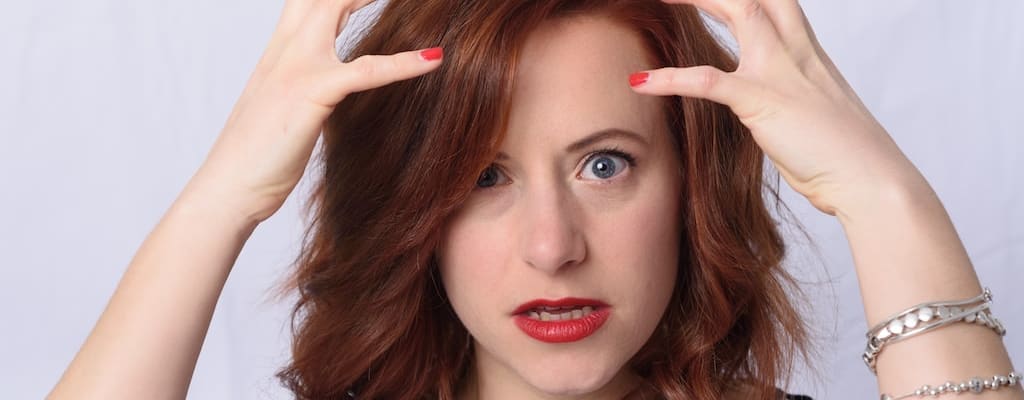drama queen: Idiom Meaning and Origin
What does ‘drama queen’ mean?
The idiom drama queen refers to a person who tends to exaggerate or overreact to small problems, seeking attention and creating unnecessary drama. They often make a fuss out of minor issues, drawing attention to themselves and their emotional state.

Idiom Explorer
An idiom used to describe someone who is in an emotional or mental state of extreme agitation, distress, or confusion.
The idiom "ice queen" refers to a woman who is perceived as cold, detached, and unemotional, often controlling her emotions and interactions with others. This term is typically used to describe someone who is aloof, distant, or unapproachable in social or professional settings.
This idiom means to throw a fit of anger or frustration by displaying disruptive and uncontrollable behavior, often characterized by yelling, screaming, crying, or stomping one's feet.
The idiom "ham it up" means to overact or exaggerate a performance or behavior in a way that is not natural or genuine.
The idiom "go overboard" means to go to great or excessive lengths, often beyond what is necessary or reasonable. It implies an extreme or exaggerated action or behavior, often resulting from enthusiasm or excitement.
The idiom "go bananas" means to become extremely excited, agitated, or irrational. It is often used to describe someone losing control of their emotions or behaving in a wild and unpredictable manner.
The idiom "give someone grief" means to continuously cause trouble or annoyance to someone, often by criticizing or complaining about their actions or behavior.
The idiom "get one's panties in a wad" means to become excessively upset, angry, or agitated over a trivial or insignificant issue.
The idiom "get one's panties in a pretzel" means to become excessively upset, irritated, or overreact to a situation. It implies an exaggerated emotional response and is often used to describe someone who is easily angered or frustrated.
Decoding The Drama Queen
The idiom "drama queen" is an expression commonly used in colloquial English to describe someone who behaves exaggeratedly or melodramatically. This term has gained popularity in recent years, particularly within pop culture and social media. It is commonly used to refer to individuals who frequently overreact and make a fuss over trivial matters.
The origins of the term "drama queen" can be traced back to the 19th century and the world of melodramatic theater. Melodrama, a popular theatrical genre during that era, often involved exaggerated acting, intense emotions, and extravagant plots. The term "drama queen" emerged as a sarcastic or mocking reference to actors who portrayed overly dramatic characters and delivered extravagant performances.
Over time, the term transitioned from specifically referencing actors to being applied to individuals in real life who exhibited similar theatrical behavior. It became a way to describe people who constantly sought attention, exaggerated their emotions, and made minor issues appear much more significant than they actually were.
In contemporary usage, the term "drama queen" is predominantly used to describe women, although it can also be applied to men. It is often associated with feminine stereotypes such as emotional volatility and attention-seeking behavior. However, it is important to note that the term is not limited to any specific gender and can be used to describe anyone who displays overly dramatic behavior.
The popularity of the idiom "drama queen" has grown significantly with the rise of social media and reality television. These platforms provide a space for individuals to showcase and exaggerate their emotions for public consumption. As a result, the use of the term has increased to describe attention-seeking behavior both online and offline.
While the term "drama queen" may be used in a derogatory manner, it is also employed humorously and playfully in casual conversations. It serves as a shorthand way to describe someone who tends to make a big deal out of small issues and often seeks attention or sympathy from others.
"in a right state" is an idiom that is closely related to the concept of being a drama queen. When someone is said to be "in a right state," it means they are extremely upset or distressed. This expression suggests that the person's emotional reaction is excessive or exaggerated, much like the behavior of a drama queen. To put it simply, a drama queen is someone who takes a minor issue and blows it out of proportion, resulting in them being "in a right state."
"attention whore" is another idiom closely connected to the idea of a drama queen. This term is used to describe someone who constantly seeks attention and will do whatever it takes to be the center of it. A drama queen often exhibits attention-seeking behavior, making a fuss or creating unnecessary emotional turmoil in order to attract attention. So, it is fair to say that a drama queen can be described as an "attention whore," someone who craves attention and will go to great lengths to get it.
"get one's panties in a pretzel" is a colorful idiom that relates to the behavior of a drama queen. This expression means to become excessively worried, upset, or worked up about something. It implies that a person is getting overly emotional or making a big deal out of a situation that doesn't warrant such a reaction. A drama queen is known for getting their panties in a pretzel over trivial matters, letting minor issues consume and overwhelm them.
Lastly, let's explore the connection between a drama queen and a "beauty queen." While these terms may seem unrelated at first, they both involve the idea of performance and attention-seeking. A beauty queen is someone who participates in beauty pageants, which require them to put on a performance and showcase their beauty, talent, and personality. Similarly, a drama queen seeks attention through exaggerated and theatrical behavior. Both situations involve individuals seeking to be noticed and admired, albeit in different contexts.
Overall, the idiom "drama queen" encapsulates the idea of exaggerated and attention-seeking behavior. It has its origins in the world of melodramatic theater and has evolved into a commonly used term in contemporary language. Its usage has expanded with the growth of social media and reality television, reflecting the way our culture interacts with and portrays exaggerated emotions.
Example usage
1. She always overreacts to the smallest things and makes a big fuss out of them. She's such a drama queen!
2. The actress on stage was exaggerating every emotion and making a spectacle of herself. She truly embraced the role of a drama queen.
3. Whenever there is any conflict in the office, she immediately creates a dramatic scene, seeking attention and sympathy. She has a reputation for being a drama queen.
More "Context" idioms



